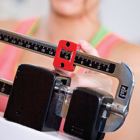 “What are you weighing these days?” “What weight are you gonna come in at?” If you’re a bodybuilder, you have heard the first question many times to be sure. If you also happen to compete, the second question is one you’ve been asked many times when you were preparing for a contest. We are all obsessed with our bodyweights. Women tend to have no interest in being heavier. They usually want to weigh less. For male bodybuilders, though, we always want to be heavier. Bigger is better!
“What are you weighing these days?” “What weight are you gonna come in at?” If you’re a bodybuilder, you have heard the first question many times to be sure. If you also happen to compete, the second question is one you’ve been asked many times when you were preparing for a contest. We are all obsessed with our bodyweights. Women tend to have no interest in being heavier. They usually want to weigh less. For male bodybuilders, though, we always want to be heavier. Bigger is better!
Whenever I am dieting and someone asks me what weight I want to get down to or how much I want to lose, I instantly state that I never want to lose one ounce of weight on the scale. I need to get rid of as much bodyfat as possible, however, so, unfortunately, I will have to be lighter. Dang! It’s very tough to get beyond always wanting to be a heavier bodyweight at all times.
Many of us tend to think that a heavier bodybuilder is always going to be a better bodybuilder. I hear people make predictions about how well they will do in an upcoming contest based on the fact that they will be X weight at X height—and that will be impossible to beat! The problem with that rationale is that bodybuilding is judged visually. The judges are looking for the physique with the best combination of size, structure, shape, proportion, balance, condition and even presentation. Yet some seem to believe that bodybuilders are, or at least should be, judged like pumpkins at the county fair. The heaviest pumpkin wins!
I always get a laugh when modern guys brag about how they compete at 240, 260 or more and sneer at past champs like three-time Mr. Olympia Frank Zane, calling him a “swimmer” and insinuating how much better their physique is because they are so much heavier than he ever was, about 185 to 190 at 5’9”. Most times when I see the photos of these bragging mass monsters, they look like 50 pounds of shit packed into a 20-pound garbage bag, with huge GH bellies, gyno, cystic acne, bald heads, torn muscles and lumpy bodyparts shot up with synthol. You look better than Frank Zane, buddy? Smoke some more crack and maybe you’ll think you can fly too!
Obsessing over our bodyweights leads to a lot of trouble in both the off-season and contest prep phases, and I speak from vast personal experience.
It’s fine to have off-season goals of reaching a certain bodyweight. The inherent trouble with that is, how much of what you gain to reach that will be muscle, and how much will be fat? It’s so easy to focus entirely on the scale and ignore what’s really going on. I can’t tell you how many times I finally realized at some point, usually around Christmas or New Year’s, that I had once again allowed myself to turn into a fat-ass! You can go by something like still being able to see your abs, but even that’s dicey at times. I can still see vague outlines of my abs even when my face is almost perfectly round and my butt is edging over into the next ZIP code.
Bodyfat testing is one way to keep bodyfat in check as you gain. For me, photos usually tell the story. Pictures don’t lie. You can look in your favorite mirror at the right time of day, when the sun is slanting in the windows at just the right angle, and still seem to be somewhat lean. Take a picture with a flash, though, and reality comes crashing down. The point here is that it makes no sense to hit any specific weight if you are just gaining fat. Anybody can gain fat. In fact, it’s practically the national pastime in the USA.
Precontest is a time when bodyweight becomes an even more emotional issue for many of us. Usually, we have a certain number in mind at which we want to compete. Unfortunately, many of us overestimate how much muscle mass we actually carry and underestimate how much fat we have to lose to achieve true contest condition. Many guys are either in denial on that point or just plain delusional. I’ve seen photos posted of guys who look like the Michelin Man, with spare tires and double chins, yet claim to be 10 percent bodyfat. In fact, no matter how fat any bodybuilder is, I’ve yet to see one who thought his bodyfat was above 12 percent!
So, let’s say a guy is nearly obese at 300 pounds. I’ve met guys just like that who tell me that they will be 275, shredded to the bone. They are way off. I can usually estimate that they will have to get down to 240 or maybe even lower. What often happens is that they don’t have time to lose as much fat as they need to lose by the date of the contest they picked, and they either withdraw or compete way out of shape and lose badly.
Even among those who do have a realistic idea of what they will need to weigh, many obsess about how much they will “fill out” in the last couple days of carb loading. That’s because it’s traumatic to wish you could be, for example, 225 onstage only to diet down into contest condition and find you are only 205. It really doesn’t matter, because a shredded body always looks bigger onstage, but they tell everyone how they will carb up and fill out to 220 by show time. The only possible way anybody is gaining 15 pounds in a day is via force-feeding and water retention, which would blur the details that took months to achieve through dieting and cardio.
The bottom line here is that bodyweight really isn’t anywhere near as important in bodybuilding as most make it out to be. It can give you a rough idea of how much relative mass someone carries, and that’s about it.
—Ron Harris
Editor’s note: Ron Harris is the author of Real Bodybuilding—Muscle Truth From 25 Years In the Trenches, available at www.RonHarrisMuscle.com. To reach him via Twitter, Instagram: @RonHarrisMuscle; YouTube: RonHarrisMuscle.





















You must be logged in to post a comment Login